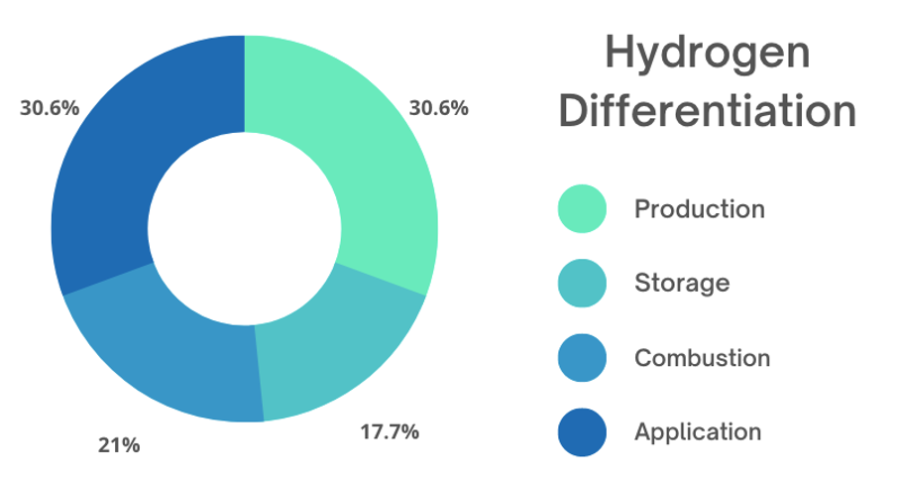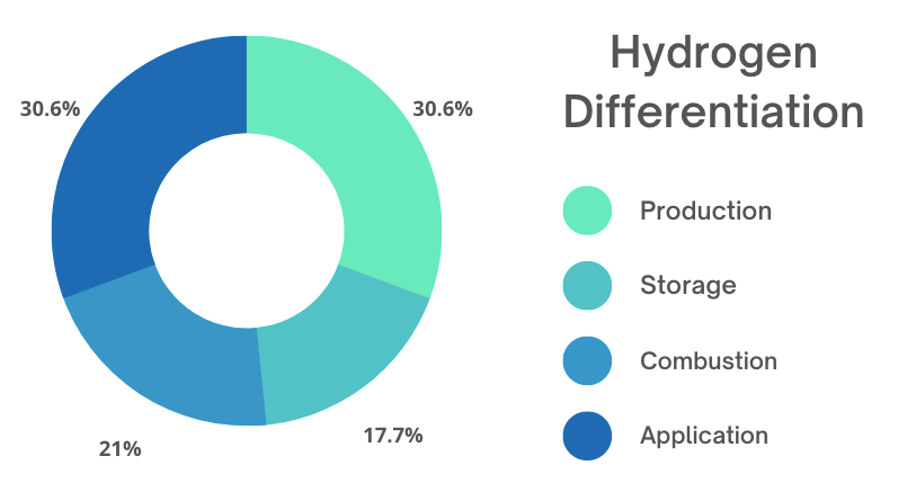Should we get HY? Analysing 60 start-ups in the hydrogen realm


Suggest a colour and there is probably a type of hydrogen associated with it. Green, blue, grey, black, pink, turquoise, yellow; all are colours that are ‘officially’ part of the hydrogen rainbow. The colour does not represent differences in hydrogen itself as all H2 molecules are identical, rather it shows the different origins with their associated colour being indicative of its sustainability credentials. Green hydrogen is generated by renewable energy and grey hydrogen with natural gas. Hydrogen, specifically green (zero emission) and low-carbon produced hydrogen, is needed in vast amounts if we want to limit global warming to 1.5 degrees as was concluded by Boston Consulting Group.
Global green hydrogen ambitions
Hydrogen can be used as an energy carrier that is very useful to store energy when the demand for renewable electricity is lower, for example during the night. Additionally, it is very useful to make hard-to-abate industries, like concrete and steel manufacturing, aviation, and shipping more sustainable.
In 2050 we need to produce 560 million tons of hydrogen globally to meet the Paris agreement goals, of which 60% should be green hydrogen. In comparison, in 2025 we will most probably produce 10 million tons of annually worldwide, which is the equivalent of three-quarters of the energy need of Germany. These challenging numbers require us to look at what inhibits us to produce hydrogen on a large scale today. Currently, the price of green hydrogen is approximately three times higher than that of grey hydrogen according to PwC. In order to close this gap we urgently need adequate government policies and more efficient technologies.
Therefore, Platform Zero focused on the latter by analysing 60 start-ups and scale-ups creating technologies to make hydrogen abundant.
Positioning remains a challenge, potentially slowing down the adoption of new solutions.
Competitive positioning is key to the success of any start-up. This could even be harder within an upcoming field like the hydrogen sector. We observed that many of the companies that we analysed claim to have the first, fastest, safest, and cheapest technology to produce, store, or combust hydrogen. However, these companies are unable to validate their claims at scale. If you are not able to substantiate your competitive edge, you will most likely have difficulties finding both clients and investors.
Behind many of these claims is the status of patented technology. It is difficult to understand what these patents exactly bring to the table, i.e., to what extent they significantly differ from other similar technologies in the field of hydrogen. Therefore, we observe that communicating the exact USP of many companies remains a challenge. We believe this can slow down the experimentation and the adoption of these technologies and therefore the solutions that the sector desperately needs.
A good example of a company that is performing well in its communication strategy is bramble energy. Bramble explains their technology in a way which makes it easy to grasp, by using videos for example.
Most startups focus on smart and efficient electrolysis technologies (hydrogen production)
We look at the hydrogen value chain with the following lens:
- The production, which includes the various electrolysis technologies,
- The storage of hydrogen, which is essential in terms of safety,
- Combustion, which includes the many fuel cell technologies, and
- Applications, with various companies working on vehicles that are driven by hydrogen.

Within the 60 startups we looked at, it becomes clear that most focus on efficient electrolysis technologies to produce hydrogen. This makes sense, since currently the necessity for green hydrogen becomes more evident and bringing down the price of the production of green hydrogen is one of the main challenges. Safe storage is also of high importance amongst start-ups. We expect that when the industry matures later along the chain of hydrogen there will be multiple significant developments. When looking at the startups with hydrogen applications, heavy transport like trucking and aviation currently prevails. Finally, we see a lot of developments in the field of hydrogen happening in Europe, more specifically in western Europe. But obviously, this can also be due to a lack of a representative sample.
Three start-ups we want to highlight
There are many interesting propositions in the 60 we found. Here are three that we want to highlight for different reasons.
1. Battolyser

Battolyser developed a product which integrates a battery and an electrolyser in one system. With the abundance of renewable energy, it will store electricity or transfer it into green hydrogen, while during shortage it could deliver stored renewable energy back to the grid. Therefore, it acts as a grid stabilizer. This Delft scale-up has exciting plans of realizing a Battolyser factory in the port of Rotterdam before the end of 2024.
2. Hypoint

Hypoint created a smart fuel cell technology for the aviation industry which increases a drivetrain’s power and energy density. Additionally, its fuel cell is revolutionary lightweight which is extremely important in the aviation industry. The company got recently acquired by ZeroAvia and the combined resources pave the way for the first zero-emission commercial aircraft.

Finally, the Belgian start-up Solenco developed an electrolyser, storage, and fuel cell in one system which is applicable for residential purposes or on a larger scale for commercial and industrial purposes. It acts as an immediate grid balancer for the electricity a company or residential home produces. On top of this, its slick design is a big plus.
